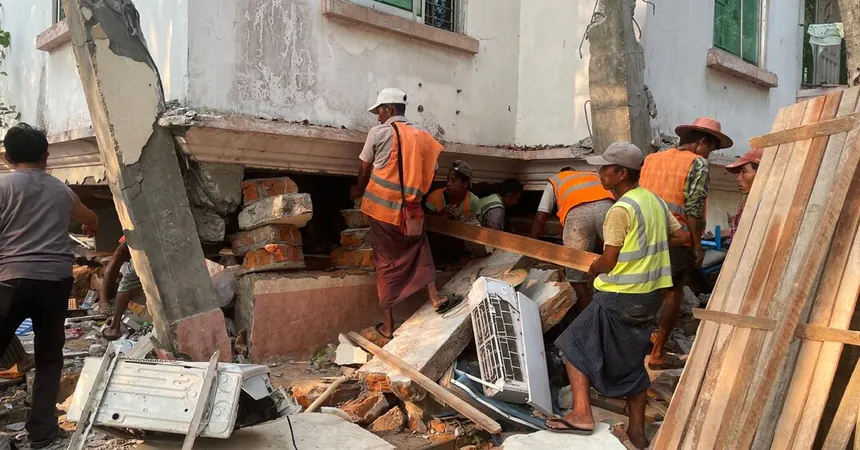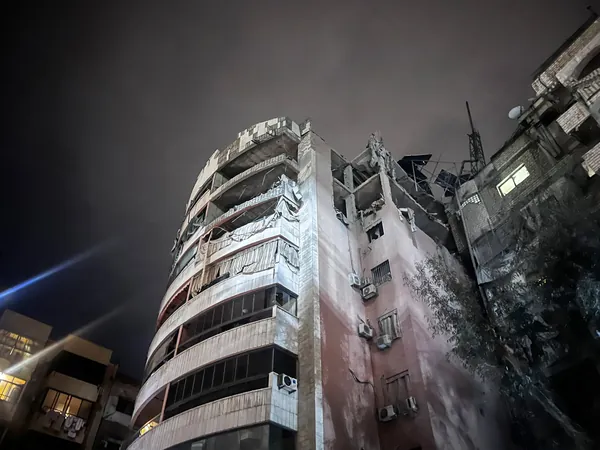
Myanmar’s Earthquake Crisis: Aid Efforts Hindered by Isolation and Political Turmoil
2025-03-28
Author: Chun
Myanmar is grappling with the fallout from a devastating earthquake that struck on Friday, exacerbated by the country's long-standing isolation and ongoing internal conflicts.
This challenging context complicates the response from the international community, even as the military-dominated government made a rare appeal for humanitarian assistance.
"We need and want the international community to provide humanitarian aid," stated military spokesman Gen. Zaw Min Tun, emphasizing their willingness to cooperate in delivering aid to those affected by the disaster.
Since the military coup in 2021 that ousted the democratically elected government, Myanmar has been largely cut off from the West, facing numerous sanctions.
These punitive measures were implemented following a brutal crackdown on dissent and serious human rights violations, particularly against the Rohingya minority. Despite these sanctions, humanitarian aid is permitted under certain conditions, leading the United Nations to announce that it is mobilizing resources to assist the victims of the earthquake.
However, accessing those in need remains fraught with logistical hurdles, particularly in a nation entrenched in civil conflict.
According to Michael Martin, a nonresident fellow at the Center for Strategic and International Studies, ensuring the safety of international aid workers poses a significant challenge. There’s a risk that the military might obstruct access to rebel-held areas or manipulate the aid distribution process, repackaging international assistance as military help.
The potential for political interference in the distribution of aid raises serious concerns.
Dr. Martin notes that while many aid organizations strive for neutrality, the military could seek to prioritize regions under its control over areas where opposition forces prevail.
Historically, this situation mirrors the aftermath of the 7.8 magnitude earthquake that struck northwest Syria two years ago.
In that case, the repressive Assad regime severely restricted international aid flows, leaving many survivors to dig through rubble with bare hands.
Myanmar’s military, which has wielded oppressive power for most of the last 60 years, has maintained strict controls on external interactions.
Economists like Stefan Dercon from the Blavatnik School of Government at the University of Oxford highlight the complexities surrounding financial transfers into Myanmar, given the sanctions on banks tied to military officials.
“The delivery of humanitarian aid will be very, very complicated,” Dr. Dercon warned.
“These operations are fundamentally logistical, requiring cooperation across many channels.”
Furthermore, raising sufficient funds to address the needs in Myanmar poses another challenge, as the country’s isolation is likely to deter Western donors.
The political climate, influenced by prior administrations which have been skeptical of foreign aid, raises additional questions about the extent of U.S. involvement in humanitarian support.
As the crisis unfolds, the need for coordinated humanitarian efforts in Myanmar has never been more urgent.
Despite the challenges, the resilience of the international community and the courage of local organizations will be crucial in providing aid to those affected by this natural disaster. Stay tuned for further updates on this dire situation.


 Brasil (PT)
Brasil (PT)
 Canada (EN)
Canada (EN)
 Chile (ES)
Chile (ES)
 Česko (CS)
Česko (CS)
 대한민국 (KO)
대한민국 (KO)
 España (ES)
España (ES)
 France (FR)
France (FR)
 Hong Kong (EN)
Hong Kong (EN)
 Italia (IT)
Italia (IT)
 日本 (JA)
日本 (JA)
 Magyarország (HU)
Magyarország (HU)
 Norge (NO)
Norge (NO)
 Polska (PL)
Polska (PL)
 Schweiz (DE)
Schweiz (DE)
 Singapore (EN)
Singapore (EN)
 Sverige (SV)
Sverige (SV)
 Suomi (FI)
Suomi (FI)
 Türkiye (TR)
Türkiye (TR)
 الإمارات العربية المتحدة (AR)
الإمارات العربية المتحدة (AR)